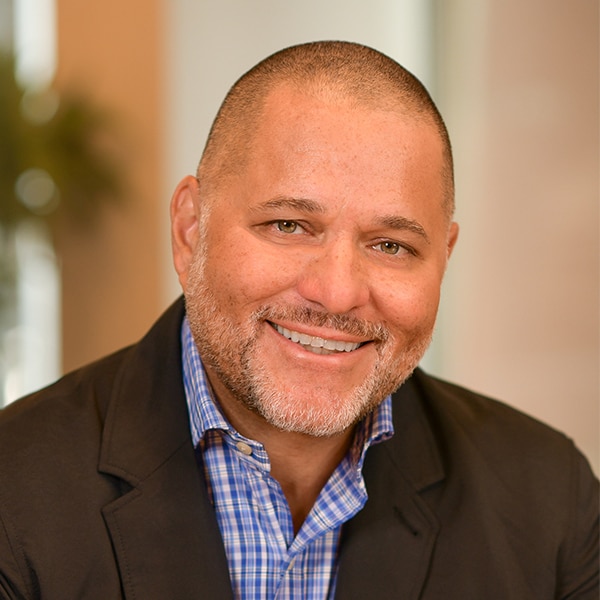Breaking Ground
Vince Bennett, President, McCormack Baron Salazar

By Jessica Hoefer
7 min read
🔉 Editor’s Note: You can enjoy a recording of this discussion here.
At National Housing & Rehabilitation Association’s 2025 Annual Meeting in Miami Beach, Vincent “Vince” Bennett, CEO of MBA Properties, Inc. and president of McCormack Baron Salazar, spoke with Maria Barry, Bank of America’s community development banking national executive, in a presentation titled “Leading Generational Change: Vincent Bennett on Thriving Communities.”

Their conversation examined the balance between building quality housing and supporting families through services tailored to their needs. Bennett highlighted the creation of Urban Strategies, a nonprofit arm focused on human capital and community services, as a key part of their development model.
Bennett structures and negotiates mixed-finance and mixed-income transactions, incorporating Low Income Housing Tax Credit equity, Community Development Block Grants, HOME, HOPE VI/Choice Neighborhoods, PHA Capital, foundation funding, corporate donations, grants, and conventional debt. He facilitates communication with local community organizations, elected officials, residents, lenders, foundations, as well as state, local, and federal agencies. Bennett has championed the company’s sustainability efforts and has overseen the development of over 8,000 green homes certified under LEED, EGC, and other sustainable building programs.
This interview has been edited for clarity and length.
Maria Barry: Can you tell us about your background? How did you get into the affordable housing industry?
Vince Bennett: I was the first in my family to go to college, and I was always drawn to community economic development. I thought I’d stay in nonprofits, so I went to grad school at Carnegie Mellon and worked in neighborhoods like the Hill District and Homewood.
I joined a community development corporation and met Willie Jones of The Community Builders—one of my first mentors. I worked for him for a day on a joint venture with McCormack Baron.
I told him it was a dream to work with him and another mentor at the Urban Redevelopment Authority. That mentor later told me, “You need to go work for McCormack Baron.” I resisted—had my doubts about the private sector—but he walked me through concepts like the double and triple bottom line.
That’s when I met Richard Baron, Tony Salazar, and Kevin McCormack and became a project manager on their joint venture.
MB: Were there any jobs that helped you prepare for the CEO role along the way?
VB: To grow in this business, you have to focus on relationships and not be so transaction-focused. The time to solve problems isn’t when they arise.
I focused on building relationships with community and political leaders, institutions, and financial professionals. We have a long history with a lot of direct investors, like Bank of America, U.S. Bank, and others. But it was about looking at comprehensive, complicated challenges. We were all dealing with the issues in the community – the stress points, the pressures around gentrification. You need to be able to attend a community meeting and be a good listener.
We also tried to build consensus where we could. Along the way, I had a lot of strong mentors who said, ‘In the long run, it’s about relationships.’
MB: How do you balance the quality products you build with building community at the same time?
VB: We’re not vertically integrated; we don’t have construction or architecture in-house, but as a developer, we handle property management. Infrastructure, for us, has always included community, supportive services, and addressing the needs of families.
Our co-founder, Richard Barron, had a strong focus on human capital. And while the physical development side—things like financing and entitlements—is tough, when you get into the human capital side, that’s a whole different kind of challenge. It requires a different approach.
One of my early asks of Richard was: We need to build infrastructure to support our community service partners. That became part of the impetus behind Urban Strategies – forming a 501(c)(3) and giving it real structure and purpose, with a focus on supporting the communities we work in.
And while we don’t always deliver the services ourselves, we build the bridges and make the connections to the best-in-class partners in the community.
MB: You had an investment from Goldman Sachs in Mississippi a few years ago. Can you tell us about that journey?
VB: This was around the time of the financial crisis—about 20 years ago. Alicia Glenn, from Goldman Sachs’ Urban Investment Group, was interested in investing in a group of developers who could partner in some of the markets they were targeting.
They were a recipient of TARP funds, and as part of that, they purchased a bank in Salt Lake City, which gave them a Community Reinvestment Act (CRA) requirement. Outside of their New York–New Jersey footprint, they were looking at opportunities in the Midwest to do some development.
They ultimately invested in our company, acquiring a one-third equity stake. About three years ago, we were able to refinance them out of the company using conventional debt. I don’t think I could get that deal done today – not in this interest rate environment. However, we managed to negotiate some favorable exit terms with Goldman.
MB: In your new role as CEO, how do you ensure your team is focused on the things that you think are important and build a company culture at the same time?
VB: It starts with the plan we set – our annual goals. We’ve five companies, and we focus on metrics and targets, like Earnings Before Interest, Taxes, Depreciation, and Amortization (EBITDA), and we clearly lay out the priorities for the year.
I ask a lot of questions. It’s a bit Socratic. But in this role—and I’ve been in it for about four years now—I’ve shifted to thinking on the business, not just in it, and trusting the people who are leading and driving results…
At the end of the day, it’s about having faith and belief that our leaders will go out there and make things happen.
MB: I understand you have a chief information officer position. I would love to learn more about that role, including how you find it helpful and what they’re spending time on.
VB: We were hit by malware four and a half years ago. It knocked us offline for about four or five days while we manually rebooted everything. We followed FBI guidance, but the experience highlighted the critical importance of data security from a risk management perspective.
One of the recommendations Goldman Sachs had made to us—something we hadn’t implemented quickly enough—was to bring in an IT director. So, we did. We hired someone with a background in both hospital systems and banking. She came in and not only focused on data protection and harvesting, but also on how to make data actionable.
She’s moved the needle for us, not simply in terms of systems, but also in how we track business Key Performance Indicators (KPIs) through dashboards and tools that help us measure performance more effectively.
She’s pushed us to rethink how we scale. You can’t grow a company relying solely on human talent – you need to look at efficiencies and scale with data. We’re not yet fully immersed in AI—we’re testing it—but she’s been working with various departments and external partners to determine how to leverage information in ways that make us more efficient and scalable.
Last year, she took on insurance as a focus area, bringing it under her direction. She’s been exploring some of the pain points we’re facing and looking for ways to modernize operations across the board.
MB: Could you share the best piece of career advice that you’ve ever received?
VB: Focusing on relationships, versus transactions. Keeping an open mind in terms of understanding the other side’s issues, whether it’s a housing authority, a housing finance agency, or an investor.